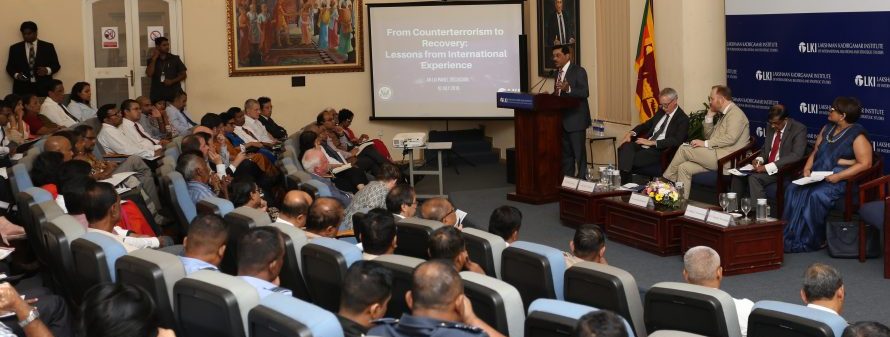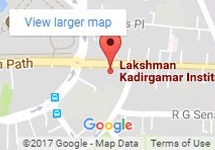
Reading Time: 3 min read
Man-made terror attacks – like natural disasters – are extreme events and their frequency appears to be rising globally. Examples of highly coordinated attacks include 9/11 in the US in 2001, the Bali Bombings in 2002, 7/7 attacks in London in 2005, and the Paris attacks in 2015. Closer to home, Sri Lanka was hit by the Easter Sunday attacks this April. This tragic experience brought home a stark truth. Quite apart from the immediate impact of death and destruction, terror attacks also have lasting effects which fundamentally disrupt economy, politics and society. We are just beginning to unravel the inter-linked nature of terror-induced disruptions and explore ways of healing democratic societies.
At a panel discussion organised by the Lakshman Kadirgamar Institute of International Relations and Strategic Studies (LKI), in partnership with the US Embassy, titled ‘From Counterterrorism to Recovery: Lessons from International Experience,’ held on 10 July 2019, the panellists explored the nature and impact of terror attacks internationally. The overarching message was that countries must respond with a comprehensive national response that involves an integrated set of security, governance and development policies.
Terrorism has evolved – new forms of terrorism as practised by ISIS have evolved from large scale, centralised and closely coordinated attacks used by Al Qaeda, to acts that are planned by a small number of individuals, with the increased use of the internet for propaganda purposes.
The US and North African experiences of combatting global terror since 9/11 suggest that success requires a soft and hard approach. The hard approach should focus on strengthening law enforcement, intelligence gathering and sharing, and closer coordination between border control agencies. The soft approach requires close engagement with community leaders to prevent radicalisation, mobilisation and recruitment, particularly of at-risk youth.
Counterterror frameworks must ensure that they do not infringe unnecessarily on democratic rights. There also needs to be greater efforts to distinguish terrorist combatants from civilians to prevent justice from being carried out arbitrarily. The experiences of Ireland and South Africa suggest this must be accompanied by political, economic and social policies to address the root causes of violent extremism and radicalisation.
There is an ongoing debate about the role of social media in propagating the spread of terrorism, and how it should be managed during crises, particularly following the recent attacks in New Zealand and Sri Lanka. Tech giants such as Facebook are making an effort towards self-regulation, but more international cooperation may be needed.
Terrorist attacks can have a significant negative economic impact, such as in Bali. To ensure economies are resilient to unexpected shocks, such as terrorist attacks, effective business continuity plans need to be in place for key economic institutions. What’s more, it is crucial that sufficient macroeconomic buffers are maintained to ensure fiscal and monetary policies can respond to shocks and ensure debt repayments.
The panel comprised Dr. Todd C. Helmus, Senior Behavioral Scientist at the Rand Corporation; Mr. John T. Godfrey, Deputy Coordinator for Regional & Multilateral Affairs, Bureau Of Counterterrorism & Countering Violent Extremism, US State Department; Dr. Radhika Coomaraswamy, former Under-Secretary-General of the United Nations, Special Representative for Children and Armed Conflict; and Dr. P. Nandalal Weerasinghe, Senior Deputy Governor, Central Bank of Sri Lanka. The discussion was moderated by Dr. Ganeshan Wignaraja, Executive Director of LKI, and the closing remarks were delivered by Ambassador Alaina B. Teplitz. Ambassador Teplitz stressed the importance of trust building, respect for the rule of law, and the need for political courage to combat extremism.
The high-profile event drew a diverse group of participants of over 150, including senior members of the diplomatic corps, senior representatives of the armed forces and police, as well as other government officials, and representatives of the media, think tanks and the private sector.
LKI is a think-tank that analyses Sri Lanka’s international relations and strategic interests, to provide insights and recommendations that advance justice, peace, prosperity, and sustainability. The Institute reflects the vision of the late Hon. Lakshman Kadirgamar by promoting the country’s intellectual profile in foreign policy research and engagement. Being present in public debates is a cornerstone of LKI’s strategy, and the Institute accomplishes this via its policy dialogues which convene a diverse range of local and international speakers.
Resources from the panel discussion
- Read the key Takeaways from the panel discussion in English, Sinhala, and Tamil.
- Read Dr. Radhika Coomaraswamy’s full remarks here.
Listen to the panel discussion
Watch the panel discussion
Photos: US Embassy in Sri Lanka



